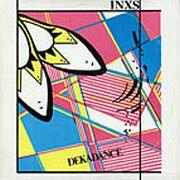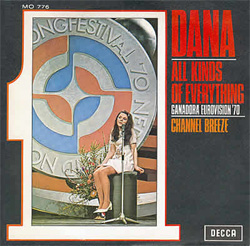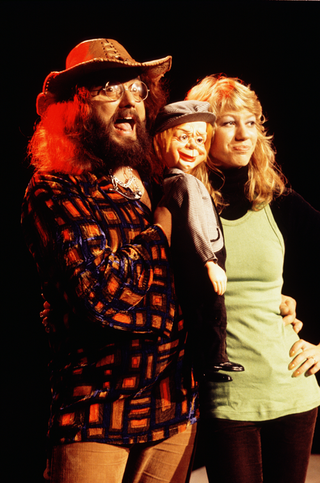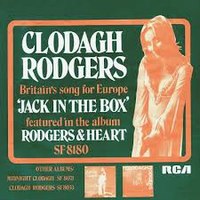Clodagh Rodgers is a retired singer from Northern Ireland, best known for her hit singles including "Come Back and Shake Me", "Goodnight Midnight", and "Jack in the Box".
The United Kingdom held a national preselection to choose the song that would go to the Eurovision Song Contest 1971.

"Making Your Mind Up" is a song by the British pop group Bucks Fizz. It was the winner of the 1981 Eurovision Song Contest, representing the United Kingdom, and was composed by Andy Hill and John Danter. Released in March 1981, it was Bucks Fizz's debut single, the group having been formed just two months earlier. Following its win in the contest, the song reached No. 1 in the UK and several other countries, eventually selling in excess of four million copies. It launched the career of the group, who went on to become one of the biggest selling acts of the 1980s and featured on their debut, self-titled album.
Pussyfoot was a British recording act of the late 1970s. The act consisted of songwriter, producer and musician Mick Flinn, and vocalist Donna Jones. Flinn remained behind the scenes, and Jones was marketed as a solo artist.

Dekadance is the title of two different collections of remixes by Australian rock band INXS: a 1983 four-track 12" and cassette EP released in the United States of songs from Shabooh Shoobah; and a 1985 seven-track cassette released in Australia of songs from The Swing. The latter included a cover version of "Jackson" as a duet by INXS' Michael Hutchence with Jenny Morris, their backing singer. This compilation peaked at No. 2 on the Australian Kent Music Report Albums Chart in April 1985.

Monty Python's Life of Brian is the second soundtrack album by Monty Python, released in 1979 alongside the film of the same name. It contains scenes from the film interrupted by linking sections performed by Eric Idle and Graham Chapman, who also acted as producers following an aborted attempt at a soundtrack album by Michael Palin. The album opens with a brief rendition of "Hava Nagila" on Scottish bagpipes, which had earlier been considered for use in a scene later cut from the film.

Monty Python's The Meaning of Life is the third and final soundtrack album by Monty Python, released in 1983 alongside their last film. Billed as "The only soundtrack album to be introduced by live fish! ", it consists of sketches and songs from the film, with a few links performed by Michael Palin and a brief appearance from Terry Gilliam.

"All Kinds of Everything" is a song written by Derry Lindsay and Jackie Smith; as performed by Dana, it won the Eurovision Song Contest 1970 representing Ireland. "All Kinds of Everything" marked a return to the ballad form from the more energetic performances which had dominated Eurovision the previous years. Dana sings about all the things which remind her of her sweetheart with the admission at the end of every verse that "all kinds of everything remind me of you". The recording by Dana became an international hit.

"Ein bißchen Frieden" is a German-language song, written by prolific German Eurovision-writing duo Ralph Siegel (music) and Bernd Meinunger (lyrics) for the Eurovision Song Contest 1982, held in Harrogate, United Kingdom. It was performed by 17-year-old German high-school student Nicole Hohloch, resulting in Germany's first win at the Eurovision Song Contest by a record margin of 61 points, setting a new record for the largest winning margin that lasted until the Eurovision Song Contest 1997. Nicole's single is still the only Eurovision entry to top the sales charts in every territory it was released in.

"Après toi" is a song recorded by Greek singer Vicky Leandros, with music composed by her father Leandros Papathanasiou –known as Leo Leandros–, under his pseudonym Mario Panas, and German composer Klaus Munro, with French lyrics by Yves Dessca. It represented Luxembourg in the Eurovision Song Contest 1972 held in Edinburgh, winning the contest.
Deborah (Debbie) Cameron is a Danish-American singer of Bahamian descent who has had a career in music in Denmark.

Katja Ebstein is a German singer. She was born in Girlachsdorf. She achieved success with songs such as "Theater" and "Es war einmal ein Jäger". She was married to Christian Bruhn, who wrote many of her songs.
Maggie Moone is a British singer, best remembered for her role on the UK version of Name That Tune.

Mouth and MacNeal were a Dutch pop duo that enjoyed commercial success in the 1970s. They are best known for their million selling recording of "How Do You Do" in 1972, which topped the Dutch chart and became a US top ten hit, also reaching number 2 in Canada, and for representing the Netherlands at the 1974 Eurovision Song Contest, finishing third with the song "I See a Star", which went on to become a UK top ten hit.
Yellow Dog was a British based rock band from the 1970s, best known for their one-hit wonder song "Just One More Night".

"Oh Boy " is a popular song written by Tony Romeo. It has been recorded by Diana Trask and Brotherhood of Man, among others. The song is about a woman whose partner/husband is no longer with her and she sadly walks the streets in an attempt to find him. Tony Romeo who wrote the song is best known for his 1970 hit "I Think I Love You" by The Partridge Family, which became a US No.1.

"Knock, Knock Who's There?" is a song written and composed by John Carter and Geoff Stephens, released on Apple Records. It was originally sung and recorded by the Welsh singer Mary Hopkin and was the United Kingdom's entry at the Eurovision Song Contest 1970, where it came second. The single version was produced by Mickie Most and reached No. 2 on the UK charts.
Nicole Croisille is a French singer and actress. She has appeared in 24 films between 1961 and 2005, and recorded several albums since 1961.

"Long Live Love" is a song by Australian singer, songwriter and actress Olivia Newton-John, released in 1974. It was the British entrant to the Eurovision Song Contest 1974 in Brighton, United Kingdom.

"Do You Know What I Mean" is a song written and performed by Lee Michaels. It was produced by Michaels.













